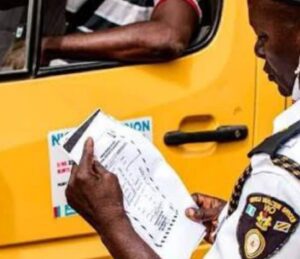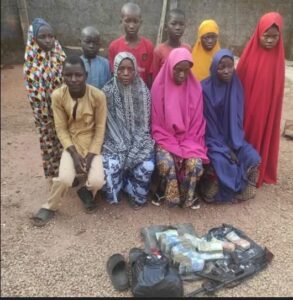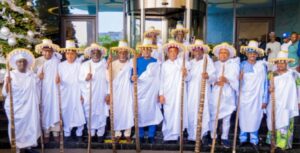
In four unanimous judgments on Monday, the Supreme Court upheld the elections of Abdullahi Ganduje, Aminu Tambuwal, Bala Mohammed and Simon Lalong as governors of Kano, Sokoto, Bauchi and Plateau states.
The court dismissed the four appeals filed by Abba Kabir Yusuf of the Peoples Democratic Party (PDP) against the election of Ganduje of the All Progressives Congress (APC); Ahmed Aliyu Sokoto (APC) against Tambuwal (PDP); Mohammed Abubakar (APC) against Mohammed (PDP) and Jeremiah Useni (PDP) against Lalong (APC), for being without merit.
Two separate panels of the court gave the four judgments, with one giving two each.
The first panel, led by the Chief Justice of Nigeria (CJN), which heard the appeals on January 14, 2020 gave judgments in relation to the governorship disputes in Kano and Sokoto states.
The CJN was however absent when the judgments were read yesterday.
Justice Sylvester Ngwuta read the lead judgment in the first judgment of the day on the appeal marked: SC/1450/2019 in relation to the Kano governorship dispute.
Justice Ngwuta upheld the concurrent findings of the election tribunal and the Court of Appeal in holding that the appellants failed to prove their case.
The judge noted that while the petitioners hinged their case on a single ground, they failed to present facts and evidence to support the ground of their petition.
He said: “The tribunal dismissed the appellants petition on the grounds that the case presented was not consistent with the ground of the petition.
“Facts adduced related to other grounds, not supported by the ground of the petition
“The lower court also found in favour of the respondents having found that the facts adduced was inconsistent with the grounds of the appeal.”
Justice Ngwuta was also of the view that Paragraph 9 of Section 138(1) of the Electoral Act 2010, on which the petition was hinged, is not a blanket provision that can accommodate any claim of irregularities and non-compliance.
He said, having found that their facts and evidence were at variance with the ground of the petition, the petitioner failed to amend their case to accommodate the new facts
“The appellant has not demonstrated any cogent reason to warrant the reversal the concurrent judgments of the two lower courts. The appeal has no merit and it is hereby dismissed,” Justice Ngwuta said.
He proceeded to dismiss the cross-appeal filed by Ganduje, saying: “The cross-appeal is spent. It has no purpose to serve with the dismissal of the main appeal.”
Other members of the panel agreed with him.
Justice Uwani Abba-Aji read the lead judgment in the appeal marked: SC/1466/2019 filed against Tambuwal’s election.
Justice Abba-Aji, in dismissing the appeal by Aliyu Sokoto and the APC, held that they failed to prove their case with credible evidence.
She upheld the findings of the two lower courts, to the effect that the petitioners were wrong to have tendered only the English translated copies of their witness statements written originally in Hausa.
The judge said: ‘The statements of witnesses, written in Hausa, were translated into English. It was strange how the English statements were admitted by the tribunal when the actual Hausa copies were not tendered.
“The translator was not called to testify as to the authenticity of the translation of the Hausa version to English. The original Hausa version of the statements are also not in evidence before this court.”
The judge held that since the original copies were missing, the translated version which were tendered amounted to hearsay evidence, which are not admissible.
Justice Abba-Aji further held that a review of the totality of the evidence presented by the appellants before the tribunal showed that they failed to lead admissible evidence sufficient to support their case.
The second seven-man panel, led by Justice Ngwuta, heard and determined the appeals in relation to the governorship disputes in Plateau and Bauchi on Monday morning and gave judgment in the evening.
The court completed hearing in the appeals in respect of both states around 12.30pm and rose, but returned to deliver both judgments a little to 5 pm.
At the resumption of proceedings around 4.45pm, Justice Paul Galumje read the first judgment in the appeal, marked: SC/1501/19, filed by Useni and the PDP against Lalong’s election. He dismissed the appeal on the grounds that the appellants failed to prove their case.
Justice Galumje faulted the appellants’ contention that Lalong gave false information to the Independent National Electoral Commission (INEC) in the Form ECF001 containing personal information.
He held that the claim by the appellants that Lalong lied that he did not have other names, was not sufficient to disqualify him from contesting the election.
The judge said: “I agreed with the lower court that the fact that the 2nd respondent (Lalong) has other names and failed to disclose them did not reduce his credit or stature.
“Even if the names were disclosed, it will increase his status to contest the election. It has not been shown that the 2nd respondent has not met the provision of the constitution as it relates to qualification,” the judge said.
Justice Galumje equally faulted Useni and his party for building their case around the provision of Section 138(1(e) of the Electoral Act 2010, which he said the Supreme Court had since voided.
He said the court struck down the provision of Section 138(1(e) of the Electoral Act in its decision in the appeal by Atiku Abubakar against INEC, marked: SC/12211/2019.
“I agree with the lower court that the claim of non-compliance was not proved. On the whole this appeal fails and it is dismissed by me,” Justice Galumje said.
He dismissed the appeal marked: SC/1500/2019, filed by Lalong, on the grounds that it has become an academic, the main appeal having been dismissed.
The last judgment was on the appeal marked:SC/1502/19 filed by Abubakar of the APC against Bala Mohammed’s election.
Justice Dattijo Mohammed, who read the lead judgment, held that the APC’s candidate failed to discharge the the burden of proof placed on him by the law.
Justice Mohammed faulted the evidence presented by the petitioners at the tribunal and held that they were without value.
He noted for instance that the petitioners tendered the English translated copies of witness statements, originally written in Hausa, without tendering the original Hausa verson.
“Some of the witnesses only adopted the English translation of their deposition as if the Hausa original version never existed.The appellant was required to tender both statements,” the judge said.
In faulting the quality of the evidence presented by the petitioners at the tribunal, the judge noted that they only called witnesses in few of the 336 polling units in Bauchu, Bagoro and Tafawa Balewa local government areas, where they queried the conduct of the election, leaving 307 polling units, where no witnesses were called.
Justice Mohammed noted that even if the votes from the polling units, in respect of which the petitioners called witnesses, were deducted from the scores of both candidate, it will not make any significant impact on the victory of the winner of the election.
He proceeded to dismiss the appeal, a decision the other members of the panel agreed with.












